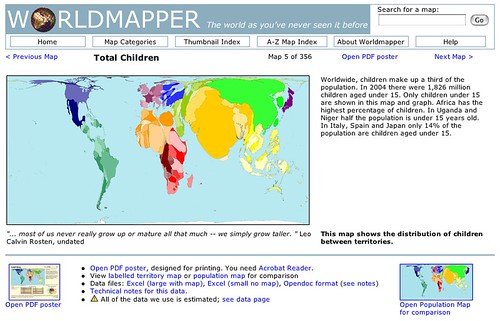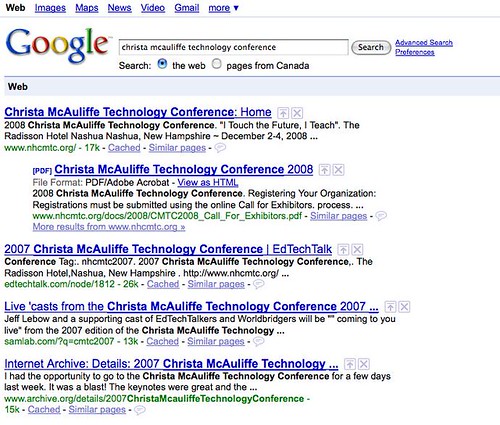Riding solo on a seven hour drive home from Nashua, New Hampshire gave me some time to reflect on the many conversations I had with educators at the Christa McAuliffe Technology Conference.
Conferences are like superfood for educators. While I can connect with my PLN everyday through the web, there is nothing like having the chance to sit down for a period of time and picking brains, sharing ideas and just being encouraged. I also had the opportunity to share through a presentation on Student Global Collaborative Projects – which I believe are crucial to building real cultural understandings without the filter of entertainiment media – and a beginners workshop entitled Ten (not-so) Secrets About Wikis. Both were well received – one was even UStreamed – and I have received emails from participants from both sessions asking followups.
On Wednesday I had the opportunity to hear Dr. Yong Zhao for the first time, who spoke on How Technology Defines Talents – What Should Schools Teach? His entertaining and sometimes humorous presentation was well worth my hour, starting with some new (to me at least) comparisons of student achievement results from 40 years ago and compared them to where those countries stand today. His findings show that the higher the nations test scores were then, the lower their current economic performance. This is startling in that it calls into questions our preponderance to compare our students to those in other countries, but the question now has to be why? Just what does this data mean or predict about our kids future?
Another captivating story from Zhao’s address was his comparisson of global populations, education and economies using a series of images from Worldmapper. Using distribution maps showing the size of  countries as relative to their populations and levels of education, we could see drastic differences between North America – I expect Canada to be tied so closely that we can use a common measure – and the rest of the world. On comparison in particular caught my eye. Images that show royalty payments showed NA as huge, with the rest of the world miniscule, while another that demonstrated toy manufacturing showed NA as very small while Asia grew. The message – the dominant position of North America currently enjoys is due to our advantage as an economy of ideas vs widgit making. But his question was – how will this change as our world economic shift continues?
countries as relative to their populations and levels of education, we could see drastic differences between North America – I expect Canada to be tied so closely that we can use a common measure – and the rest of the world. On comparison in particular caught my eye. Images that show royalty payments showed NA as huge, with the rest of the world miniscule, while another that demonstrated toy manufacturing showed NA as very small while Asia grew. The message – the dominant position of North America currently enjoys is due to our advantage as an economy of ideas vs widgit making. But his question was – how will this change as our world economic shift continues?
What was really interesting was the ability and number of people to join the conference virtually. Both David Warlick‘s Tuesday keynote and Zhao’s message were UStreamed, with almost 50 people tuned in for Dave’s address. A number of other people were twittering and live blogging during both presentations, extending the conversations beyond the physical space (isn’t that a great model for schools?). After leaving for another event in North Carolina, David even captured most of my tweets on Zhao’s address and blogged them. Fascinating and increasingly connected community we have here.
And the question, of course, continues to be – what does this mean for our schools? If a focus on comparing our students test scores with students from other global communities really means little in terms of predicting future success, just what are the measures that matter, and what are the skills that our kids will need for their future?
Technorati tags: technology, education, whipple, learning, yong zhao, nhste, nhcmtc, nhcmtc08

 Friedman didn’t specifically mention sports, but yesterday I was drawn to this
Friedman didn’t specifically mention sports, but yesterday I was drawn to this  As users get correct answers – it’s a fairly simple vocabulary multiple choice game – a couple of philanthropic organizations will work with the UN Food Program to ship a few grains of rice. The more success visitors have, the more rice gets distributed.
As users get correct answers – it’s a fairly simple vocabulary multiple choice game – a couple of philanthropic organizations will work with the UN Food Program to ship a few grains of rice. The more success visitors have, the more rice gets distributed. countries as relative to their populations and levels of education, we could see drastic differences between North America – I expect Canada to be tied so closely that we can use a common measure – and the rest of the world. On comparison in particular caught my eye. Images that show royalty payments showed NA as huge, with the rest of the world miniscule, while another that demonstrated toy manufacturing showed NA as very small while Asia grew. The message – the dominant position of North America currently enjoys is due to our advantage as an economy of ideas vs widgit making. But his question was – how will this change as our world economic shift continues?
countries as relative to their populations and levels of education, we could see drastic differences between North America – I expect Canada to be tied so closely that we can use a common measure – and the rest of the world. On comparison in particular caught my eye. Images that show royalty payments showed NA as huge, with the rest of the world miniscule, while another that demonstrated toy manufacturing showed NA as very small while Asia grew. The message – the dominant position of North America currently enjoys is due to our advantage as an economy of ideas vs widgit making. But his question was – how will this change as our world economic shift continues? Participatory radio is magical, where individuals and groups produce programming by and for their own communities, not to make a profit but to share their eclectic cultures and build understandings. While almost all stations have a full-time staff member or two, their role is to train, support and guide the content producers – the volunteers who invest their time and efforts – and not to produce content.
Participatory radio is magical, where individuals and groups produce programming by and for their own communities, not to make a profit but to share their eclectic cultures and build understandings. While almost all stations have a full-time staff member or two, their role is to train, support and guide the content producers – the volunteers who invest their time and efforts – and not to produce content. One of my good (non-teaching) friends lives in the next town over, so I am using this trip to spend some time with him as well. As I drove over to Nashua this morning, I was thinking about how the web has wired us together. We keep in contact closely, even though we only see each other a couple of times a year.
One of my good (non-teaching) friends lives in the next town over, so I am using this trip to spend some time with him as well. As I drove over to Nashua this morning, I was thinking about how the web has wired us together. We keep in contact closely, even though we only see each other a couple of times a year. Case in point. As a young boy, I remember watching hockey on TV with my brother and dad. Our participation was passive – we watched! Last night my stepson came up the stairs midway through the Eagles-Cards NFL game, carrying his laptop, and sat down in front of the TV. As I watched, he proceeded to continue to watch while he interfaced with an on-line game linked with the game in progress on the TV. Seems he was participating in the game by “calling the plays” in advance and trying to win a game running parallel to, and dependent on, the game being played.
Case in point. As a young boy, I remember watching hockey on TV with my brother and dad. Our participation was passive – we watched! Last night my stepson came up the stairs midway through the Eagles-Cards NFL game, carrying his laptop, and sat down in front of the TV. As I watched, he proceeded to continue to watch while he interfaced with an on-line game linked with the game in progress on the TV. Seems he was participating in the game by “calling the plays” in advance and trying to win a game running parallel to, and dependent on, the game being played. Thursday when I googled the
Thursday when I googled the